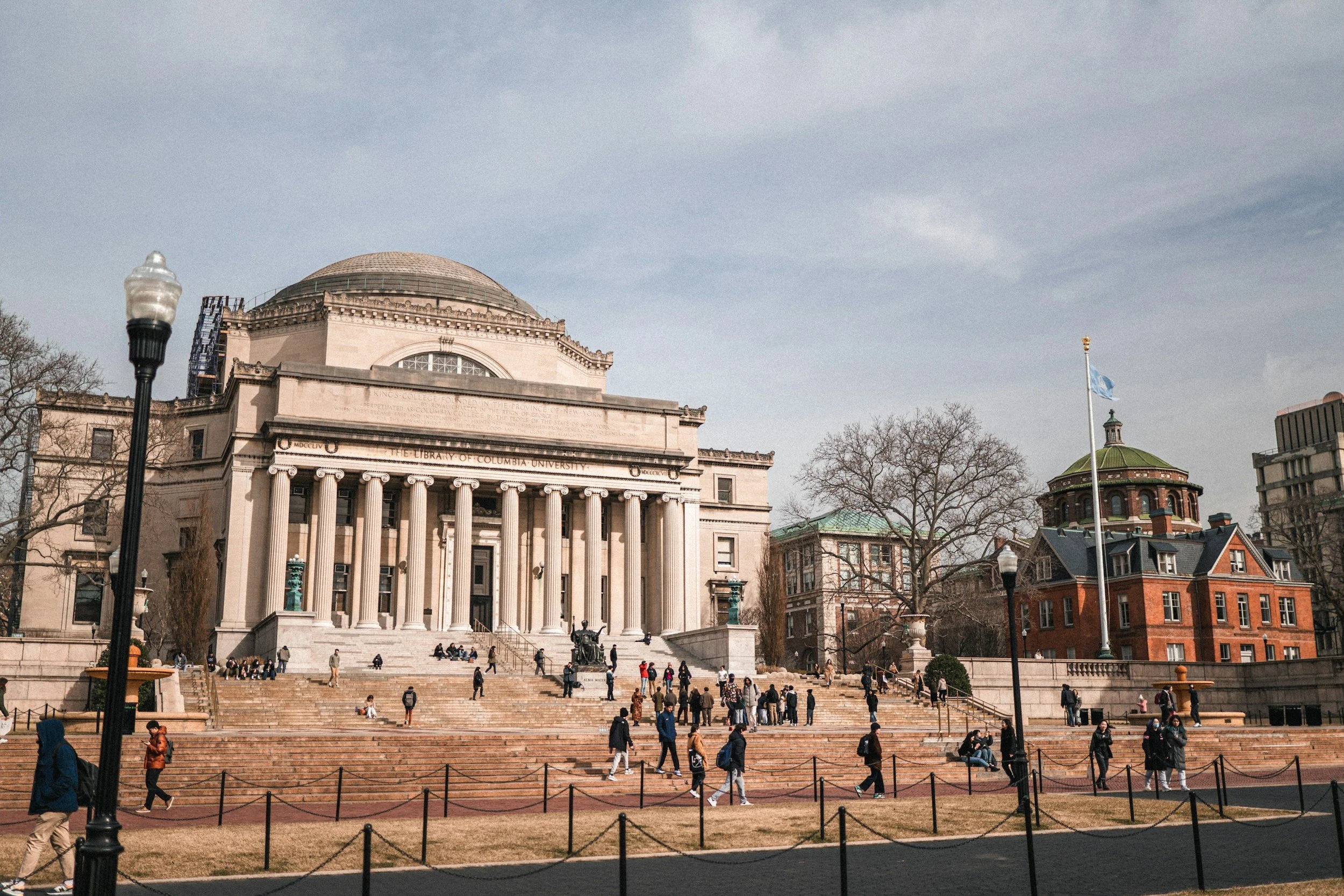Things have been SO INCREDIBLY BUSY around the office as we head into the final stretch of summer. Somehow, it’s already a third of the way through August – when did that happen? Public schools start next week! So, you’re getting a double-feature this week: two weeks’ worth of higher ed news in one place.
And boy did things get crazy!
BIGGEST COLLEGE-RELATED NEWS OF THE WEEK
DOJ Memo Redefines How Colleges Can Address Antidiscrimination Laws
On July 29, the Department of Justice issued updated guidance on how antidiscrimination laws must be interpreted and applied by various entities – including colleges and universities. Despite its sweeping scope, the move drew surprisingly little media attention. The memo goes beyond the parameters outlined in the 2023 Supreme Court decision on affirmative action and, in at least one instance, appears to directly contradict it.
The Court had previously allowed that race could be considered indirectly in admissions when linked to a personal quality – for example, awarding credit for a student’s courage in overcoming racial discrimination or for leadership shaped by cultural heritage. The DOJ memo takes a harder line, warning that “Overcoming Obstacles Narratives” and “Diversity Statements” may be “potentially unlawful” if they advantage applicants whose stories are inherently tied to protected characteristics. Just two days later, and on the eve of the 2025–26 Common App launch, the University of Virginia and several other schools removed all supplemental essays from their applications. Cornell University went further, retracting its published prompts mid-cycle, leaving many students mid-draft and scrambling for next steps.
White House Orders Greater Transparency in College Admissions
One week later, President Trump issued an August 7 memorandum directing the Department of Education to revamp and expand the federal Integrated Postsecondary Education Data System (IPEDS). The stated goal: make admissions data more accessible and understandable for students and parents. More realistically, though, I would think that the primary goal is to ensure that institutions receiving federal aid are transparent about how they select students. Key measures include redesigning the IPEDS online portal, streamlining the data submission process, expanding reporting requirements starting in the 2025–26 school year, strengthening data accuracy checks, and imposing penalties on institutions that submit incomplete or inaccurate information.
Lawsuit Targets Elite Colleges’ Use of Early Decision to Inflate Costs
A federal class-action lawsuit filed in Massachusetts alleges that 32 elite universities – including Penn, Brown, Duke, and Columbia – along with several admissions organizations, have conspired to use binding Early Decision policies to limit competition and drive up tuition. The complaint argues that requiring students to commit before seeing financial-aid offers removes the ability to compare packages, disadvantaging price-sensitive families and favoring wealthier applicants. Plaintiffs are seeking damages and an end to binding ED practices. Boy, I try to stay neutral here but I would not be a happy camper if they got rid of ED. I also don’t think it’s fair to say that wealthier applicants are favored, because students with significant financial need also do quite well in the ED process – they are able to get estimates of their financial aid packages before they apply, and they can back out of the ED commitment, no questions asked, if the finances don’t work out. I do understand the frustration students feel when they can’t compare prices for merit aid, but choices have to be made.
Columbia’s $220M Settlement with Trump Administration Draws National Attention
Two weeks ago, Columbia University agreed to pay a $220 million fine to resolve allegations of antisemitism and discriminatory DEI practices – a deal that restores $1.3 billion in federal funding. Columbia has not admitted wrongdoing but has committed to strengthening protections against antisemitism and complying with antidiscrimination laws, according to NPR. The settlement also includes oversight by an independent monitor, a move some see as an encroachment on higher ed independence. Columbia leaders frame the decision as restoring academic freedom, and for current students and those arriving this fall, the resolution is at least a relief that their federal funding is secure.
Barnard’s Settlement and Layoffs
Columbia-affiliated Barnard College also reached a settlement – this one stemming from a lawsuit brought by Jewish students and nonprofits. The agreement bans mask-wearing on campus, creates a Title VI coordinator role to ensure compliance with antidiscrimination laws, and cuts all ties to the Columbia University Apartheid Divest protest group. Shortly after, Barnard announced the layoff of 77 staff members in a “restructuring” effort. While faculty and administrators were spared, the move raises concerns about the financial health of the women’s liberal arts college.
Northern Virginia Schools to Comply with Title IX
At the end of July, the Department of Education ruled that five Northern Virginia school districts – Alexandria, Arlington, Fairfax, Loudoun, and Prince William – are in violation of Title IX because they’ve been allowing transgender students to use restrooms and other intimate spaces that align with their gender identity rather than their biological sex. The districts were initially given 10 days to comply with a federal resolution that would force them to roll back those inclusive policies and adopt language that defines sex strictly as male or female based on biology. If they don’t comply, the Department of Justice could step in with enforcement.
Update: As of this week, the districts have been granted an extension to August 15 to respond and determine next steps. Closed-door meetings have been underway, and community voices – especially those of students – have been front and center. At DCCC, we believe every student deserves to feel safe and respected at school, no matter their identity. We hope these districts can uphold inclusive values while navigating the legal pressure ahead.
BEST ARTICLES OF THE WEEK
Above, we shared news about Columbia University’s settlement with the presidential administration, noting that reactions have been mixed. The New York Times dove deeper into why: while Columbia insists it struck a balance between upholding its principles and complying with the law, many in higher ed worry it signals a dangerous precedent — one where political interference in research and teaching starts to feel “normal.” Columbia lit professor Joseph R. Slaughter summed up the academic concern perfectly. Meanwhile, some in the Jewish community see the administration’s aggressive posture toward Columbia as more political than protective. But with $1.3 billion in federal funding at risk, many faculty and students felt settling was about survival.
The settlement has emboldened the administration to pursue similar deals with other schools, including Cornell, Duke, Northwestern, Brown — and especially Harvard. Harvard has so far refused to budge, even suing the administration, and its new president, Alan Garber, is widely respected for balancing a willingness to hear all sides with a firm hand on core principles. As one colleague put it, “Even people who disagree with Alan both trust and admire him… It’s his superpower.”
In another deeply reported piece, the Times looked at the President’s new requirement for colleges to disclose detailed admissions data — including race, gender, test scores, and GPAs for both accepted and rejected applicants. Supporters say it could expose hidden discrimination; critics worry about how the data might be used. But there’s a big wrinkle: nearly everyone at the National Center for Education Statistics — the very agency that would collect and analyze the data — has been fired. Out of about 100 employees, just four remain. Without the statisticians who ensured accuracy and comparability, some fear the data could be unreliable, or worse, selectively interpreted. As one union leader put it, “When you fire the professionals… that allows you to make up whatever facts you want.”
And if all this back-and-forth between government and higher ed has you craving a mental break, The Atlantic has a great list of books exploring what’s really at stake for universities — from their role in local economies to the value of pure research — plus a reminder that higher ed was never meant to be just job training (though landing a good job is a nice perk). Or skip the politics entirely and read this fun piece about Drexel senior RJ Smith, who’s running a Michelin-inspired Afro-Caribbean supper club from his dorm. While we can’t promise most college students cooking at this level, we posted a couple weeks ago about some schools where good eats are a part of the culture. Campus dining has definitely come a long way!
OFFICE HAPPENINGS
August 1 has come and gone, and with it, the floodgates have opened — all those long-awaited supplemental essays are finally here! The good news? These usually come together very quickly, since we’ve been putting in the groundwork for months, fine-tuning the generic supplementals so everyone’s ready to hit the ground running the moment prompts drop!
That prep pays off big time when schools decide to pile on the extras (looking at you, Northwestern and Virginia Tech). Now it’s just a matter of tailoring and polishing — which means we can keep momentum high without losing too much sleep.
And while we’re still stuck with summer heat and humidity in the DMV this week, we’ve had a few less oppressive mornings. If you can, sneak in a walk or a coffee outdoors before the afternoons turn steamy again — essay season is in full swing, but a little sunshine never hurts.










